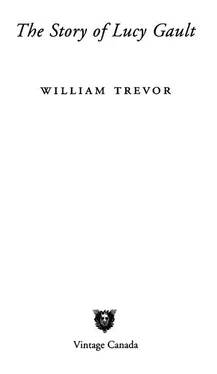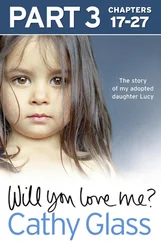Trevor, William - The Story of Lucy Gault
Здесь есть возможность читать онлайн «Trevor, William - The Story of Lucy Gault» весь текст электронной книги совершенно бесплатно (целиком полную версию без сокращений). В некоторых случаях можно слушать аудио, скачать через торрент в формате fb2 и присутствует краткое содержание. Год выпуска: 2002, ISBN: 2002, Издательство: Knopf Canada, Жанр: Старинная литература, на английском языке. Описание произведения, (предисловие) а так же отзывы посетителей доступны на портале библиотеки ЛибКат.
- Название:The Story of Lucy Gault
- Автор:
- Издательство:Knopf Canada
- Жанр:
- Год:2002
- ISBN:9780307366047
- Рейтинг книги:5 / 5. Голосов: 1
-
Избранное:Добавить в избранное
- Отзывы:
-
Ваша оценка:
- 100
- 1
- 2
- 3
- 4
- 5
The Story of Lucy Gault: краткое содержание, описание и аннотация
Предлагаем к чтению аннотацию, описание, краткое содержание или предисловие (зависит от того, что написал сам автор книги «The Story of Lucy Gault»). Если вы не нашли необходимую информацию о книге — напишите в комментариях, мы постараемся отыскать её.
The Story of Lucy Gault — читать онлайн бесплатно полную книгу (весь текст) целиком
Ниже представлен текст книги, разбитый по страницам. Система сохранения места последней прочитанной страницы, позволяет с удобством читать онлайн бесплатно книгу «The Story of Lucy Gault», без необходимости каждый раз заново искать на чём Вы остановились. Поставьте закладку, и сможете в любой момент перейти на страницу, на которой закончили чтение.
Интервал:
Закладка:
Alms were begged for the church’s repair and then the woman went.
*
Lucy left Montemarmoreo reluctantly, yet knowing she would not ever return. Hers was a different allocation of time and circumstance from her mother’s, from her father’s. She could not pretend.
When winter came that same year, when the memory of her long journey had begun to lose its vividness, she read again – methodically in order of their composition – the letters she had received from Ralph. They stirred the love that still affected her, but the people of the letters were other people now, as her mother and her father were. She took the unfinished embroidery from her embroidery drawer and wrapped Ralph’s anguished pleas in it, tying the bundle with string she made from her coloured threads.
2
One afternoon in Enniseala Lucy looked for the black bicycle. She looked for it near the lighthouse where the fishing boats came in and in the poor part of the town. She thought she saw it once, outside the League of the Cross Hall, and again in MacSwiney Street, but when she went closer she realized she’d been mistaken. She took to sitting by one of the windows in the café attached to the bread shop. She did not know what she would do if the bicycle went by or what she would do if she saw it propped up against a shop window or a wall, as she had before. Her compulsion came from nowhere that she knew about, and seemed to feed on the very failure of her efforts. In the end she asked, and was told that the man she sought had been admitted to the asylum.
She brought that information back to Lahardane, but it elicited neither interest nor much of a response. It was a suitable thing, the unspoken opinion seemed to be; and Lucy imagined it voiced in the kitchen when she wasn’t there, with a note of satisfaction in whatever exchanges there were. She drove out to the asylum when she was next in Enniseala and drew on to the verge by high iron gates. The brick building on a hill had an empty look, as if there were no inmates, but she knew that wasn’t so. The locked gates were intimidating. A chain trailed down one of the pillars, a bell suspended from an iron bracket on the other side.
She drove away again.
*
On the dining-room table she stretched out another piece of linen, each corner weighed down with a book. Carefully she copied on to the cloth the watercolour sketch she had made: poppies on an ochre ground. She chose the silks and laid them in a row.
She wondered how many times she had done all this before; how many times she had said when an embroidery was finished, ‘You might like to have it?’ She had never found a better way of not appearing to presume that there was merit in what she offered. The giving was a pleasure, her exaggeration part of it when she said there was no room left on the walls at Lahardane.
She stitched in single threads to mark the colours: the orange and red of the poppies in half a dozen shades, four different greens for the spiky leaves, the ochre frilled with grey. Months it would take to complete, all winter.
*
‘Bring Miss Gault her tea.’
Behind the bread counter in the café the wife of the baker gave the order to a child in a flowered overall. So she was safely back, the observation had been in the café when she had returned from Switzerland and Italy, the purpose of her journey known but not remarked upon.
She hung her umbrella on the back of her table’s other chair. Rain had suddenly blown in that afternoon.
‘That’s shocking weather,’ the woman behind the bread counter called out to her.
The woman’s red hair was greying now and a look of relief had become established in her eyes, as if she gave silent thanks for no longer being of child-bearing age: she’d had ten girls and a boy. Never putting in an appearance in the café, her husband baked half the town’s bread, and cakes and buns and doughnuts.
‘Cakes, is it, miss?’ the child enquired, scattering with her hand the crumbs on the stained tablecloth and wiping away the milk that a cork mat hadn’t entirely absorbed. ‘Will I bring them assorted?’
‘Thank you.’
The child’s features were pinched, the hand that was rearranging the sugar bowl and milk jug affected by chilblains. Her other hand was bandaged.
‘Isn’t the rain heavy for itself, miss?’
‘It is. Are you Eileen? I confuse you with your sister. I’m sorry.’
‘Is it my older sister?’
‘I think it might be.’
‘My older sister’s Philomena.’
‘And you’re Eileen?’
‘I am, all right. Wait till I’ll bring you the tea now.’
Above the door that led to the back regions, a plaster figure, fingers raised, blessed the café. Lucy watched the child pass beneath it, then rooted in her purse for a threepenny piece in case she forgot later. She dropped it into her glove, knowing she would feel it there. She watched the rain through the painted letters on the glass of the wide half-curtained window. People were hurrying on the street, raincoats over their heads.
‘You’ll have us drowned, Mattie!’ the woman behind the counter shouted at a ragged man who’d just come in, whose drenched clothes were dribbling on to the floor. He was often on the streets, playing his accordion for coppers.
‘Sure, won’t it wash the floor for you?’ He sat down at a table near the door, his accordion on the table in front of him.
‘There’s only these ones left,’ the girl called Eileen said, referring to the cakes she’d brought. A wedge-shaped piece had been cut out of the sponge of each, artificial cream and raspberry jam inserted and the piece replaced. Six there were on the plate. ‘They’re the nicest anyway, miss.’
‘They’re lovely, Eileen.’
A dinged metal teapot was carefully lowered on to the cork mat, a knife placed beside an undecorated white plate.
‘Would I bring you a slice of the brack, miss?’
‘No, no, I have plenty, Eileen.’
She poured out the strong, dark tea and weakened it with milk. She peeled the paper from the bottom of one of the sponge cakes. Other people came in from the rain, a pram pushed to the table next to the accordion player’s, drops shaken from a red umbrella, one of its ribs protruding awkwardly when it was collapsed. ‘It’s here for the duration,’ someone remarked and there was laughter.
How she would like to be addressed in the easy way the accordion player had been! How she would like to take part in the badinage! ‘The Protestant woman’s still waiting for her change,’ one of the counter girls had said in Domville’s not long ago. It was how they thought of her, how they described her when her name escaped them or if they didn’t know it, what her appearance and her dress suggested, as her voice did, as their manner with her did. A Protestant woman was a relic, left over, respected for what she was, not belonging. And she among such women was more different still. After she’d left Domville’s that day, the girl who hadn’t known her would have been told.
She poured more tea and asked for hot water, which came with time. Blurred sunlight weakly lit the window, was lost and then flickered back again. The colour-wash of the houses across the street brightened – pink and green, slates of a roof glistening. She was as used to being different as she was to feeling alone. The same thing perhaps it was, and anyway it was ridiculous to mind.
The moment passed. Elation – exhilaration almost – had been her mood during the months she’d stitched her embroidery of poppies. She had not sought to understand, only continuing in her obedience to an intention that was entirely her own, to do what she was drawn to do. She watched the people in the café for a little longer, the accordion player finishing the cup of tea he was not asked to pay for, the baby sleeping in its pram, a couple eating fish and fried potatoes, two women intently conversing. She found the threepenny piece in her glove and left it under the rim of her saucer. She paid at the counter.
Читать дальшеИнтервал:
Закладка:
Похожие книги на «The Story of Lucy Gault»
Представляем Вашему вниманию похожие книги на «The Story of Lucy Gault» списком для выбора. Мы отобрали схожую по названию и смыслу литературу в надежде предоставить читателям больше вариантов отыскать новые, интересные, ещё непрочитанные произведения.
Обсуждение, отзывы о книге «The Story of Lucy Gault» и просто собственные мнения читателей. Оставьте ваши комментарии, напишите, что Вы думаете о произведении, его смысле или главных героях. Укажите что конкретно понравилось, а что нет, и почему Вы так считаете.











